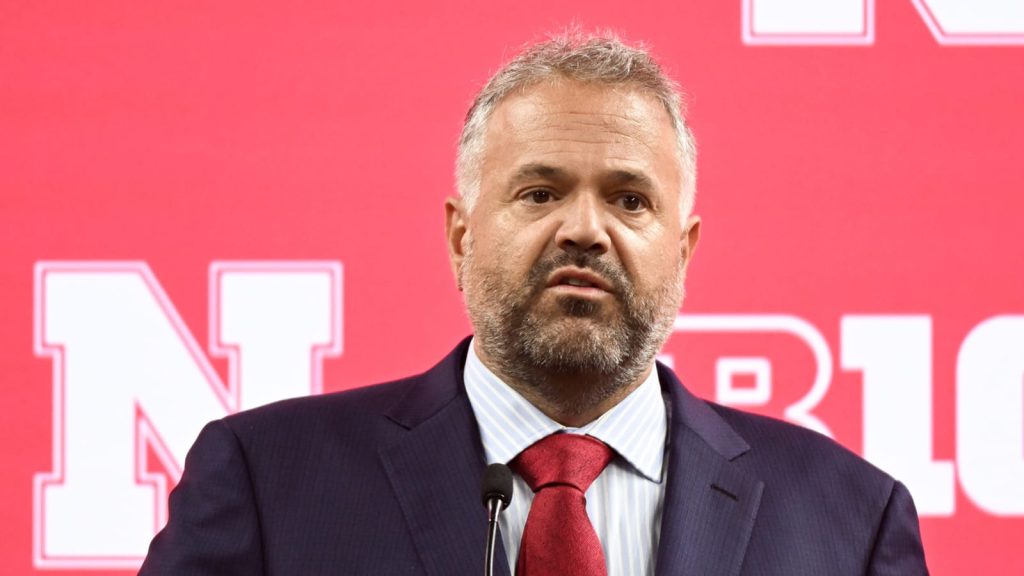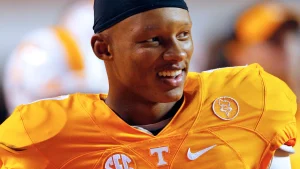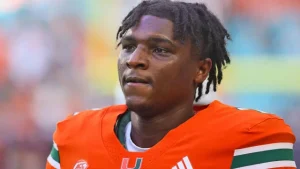
The Big Ten Conference acknowledged a mistake in officiating during Nebraska football’s game against No. 4 Ohio State. Just before halftime, Nebraska appeared to gain a first down, but the officials marked them short, leading to confusion and allowing the clock to continue running. The league released a statement on Monday addressing the error.
During Nebraska’s last drive of the first half, on second down needing two yards at the Ohio State 39-yard line, the ball was incorrectly spotted after a run by RB Emmett Johnson. He clearly crossed the 37-yard line, warranting a first down for Nebraska. The game should have been paused for a review due to the significance of the spot.
Fortunately for Nebraska, John Hohl successfully kicked a 54-yard field goal. However, this was just one of several clear mistakes in a game where the Huskers lost by three points on the road.
On Monday, Nebraska coach Matt Rhule was asked about his discussions with the league regarding officiating, and he provided an extensive answer.
“I want to start by commending the league for issuing a statement. The last thing I want is to focus on officiating calls after a loss when I’m trying to prepare our team for UCLA. I think it’s commendable of Commissioner Tony Petitti and Bill Corollo, the head of officiating, to take this step. We all seek transparency. When you ask me about specific plays, I try to provide clear answers. In that game, especially regarding situational football, we’re working to improve our performance during crucial moments like the end of the half and the end of the game. When we have only one timeout and there’s a questionable spot, it complicates coaching decisions. They acknowledged the issue, and that’s really all I’m looking for.”
In college football, I stood alongside Coach Joe Paterno. Back then, officials would make calls with their whistles and flags without the benefit of numerous camera angles, since games weren’t televised nationally. You accepted the calls as they were. Coach Paterno never yelled at the officials; that was just part of the game. Now we have instant replay, initially intended to correct clear mistakes. Recently, there was a situation where the clock changed from three seconds to six during the Indiana game. As an official, I can only imagine the pressure to make controversial calls knowing they might be overturned. If there’s a close fumble and they think the player was down, officials are told to rule it a fumble to keep the game moving, leaving it for replay to decide. The officials have a lot on their minds, especially with huge crowds and the pressure of determining pass interference.
I won’t complain about judgment calls; that’s not my style. I’ve addressed replay issues, especially when we’ve had plays deemed incorrect the next day. In the past, replay was managed in-house, but now it’s centralized elsewhere, which is a significant change. I support the players and coaches, but I also stand up for the officials calling the game. I’ll share my thoughts respectfully but won’t overstep.
I want everyone, including my daughters and those in Norfolk and Duquesne, to know that both times I’ve received a penalty this year, it was later deemed incorrect. I respect officials and maintain my coaching style from the past 12 years—aggressive yet disciplined. No one on my sideline engages with the officials. I appreciate the league’s statements, but I recognize the difficulty of making those calls, especially when controversial decisions can lead to heightened scrutiny and changes in emphasis, like the two offensive pass interference calls we faced at critical moments recently. The weekly changes in points of emphasis can significantly affect game strategy and mechanics.







